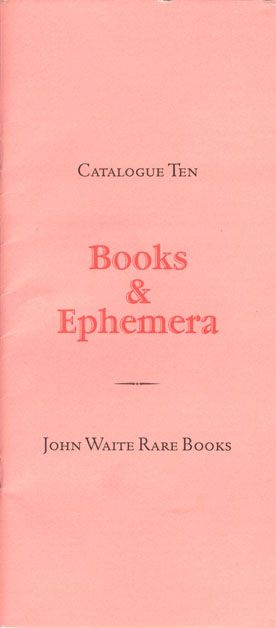John Waite Rare Books<br>Offers

John Waite Rare Books<br>Offers
By Michael Stillman
Vermont bookseller John Waite Rare Books is offering an eclectic collection of "Books & Ephemera" in their recently released tenth catalogue. While some of the material reflects their northern New England location, there are also items you can't help but wonder how they made their way to Vermont. Perhaps it is because Vermont has long been a vacation spot or place for second homes. Here are a few of the items Waite is offering.
Truman Capote and Tennessee Williams had an on-again off-again friendship over the course of their lives. They were best of friends early in Capote's career and at one point sailed together from Europe to America. Waite quotes from Williams' writings, "In those days Truman was about the best companion you could want. He had not turned bitchy. Well, he had not turned maliciously bitchy." However, in later years, when Capote turned "maliciously bitchy," Capote would depict Williams, in Waite's description, as "a washed-up, self-pitying, and neurotic drunk." So it is interesting to see Capote's Music for Chameleons, in which he dedicates the book to Williams. It was published in 1980, nearing the end of both authors' lives. This copy is signed both by Capote on the title page and Williams on the dedication page. Item 23. Priced at $2,500.
Item 13 is an interesting undated slavery related item from the 1850s. It is a song sheet for a piece called "Pretty Dilly Burn." It is a song supposedly presented through the voice of a male slave (though lyricist George Meeser was undoubtedly a white northerner). It retells how slavery breaks up a beautiful romance between two slaves, but in the end, they are brought back together through the goodness of the singer's kind master. Exactly what this strange connection of good and evil was meant to say in this era when the nation was becoming polarized by slavery is not clear. In the song, the singer, treated well by his master, falls in love with Dilly Burn, overworked by hers. Then one day, Dilly Burn's master sells her "for a paltry sum of gold," and the two are parted. The singer becomes despondent, his master asks why, and he explains. His kindly owner responds by buying Dilly so the two can be together. The song closes with "And now we're happy in our cot, and massa's pleased to see, How two fond hearts that truly love, tho' black, can happy be." The complete lyrics to this song and an image of the song sheet can be found on the Library of Congress website at http://memory.loc.gov/cgi-bin/query/S?ammem/amss:@field(TITLE+@od1(Pretty+Dilly+Burn++Andrews,+Printer,+38+Chatham+Street,+N++Y++[n++d+])). $400.